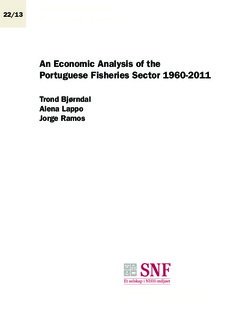| dc.description.abstract | This paper undertakes an economic analysis of the Portuguese fisheries sector and fish markets for the period 1960-2011. In this period the Portuguese economy has undergone a transformation as well as been subject to numerous external shocks. These include the revolution of 1974, substantial emigration as well as immigration, membership of the European Union in 1986 and adopting the Euro in 1999. The fisheries sector was exposed to a major shock of its own: the introduction of 200 mile Exclusive Economic Zones in 1977 essentially lead to the demise of Portugal as a Distant Water Fishing State. As a consequence of these shocks, the Portuguese fisheries sector and trade have undergone tremendous changes. It is remarkable that the overall supply of fish (tonnes) into Portugal, measured as domestic landings + exports – imports, was around 500,000 tonnes annually in the early 1960s, reaching a peak of 627,000 tonnes in 1967. Due to the macroeconomic shocks, it subsequently fell to a bottom level of 246,000 tonnes in 1979. By the mid 1980s, supply started increasing and in 2007, total supply was estimated at 655,000 tonnes, the highest level ever recorded. | no_NO |
